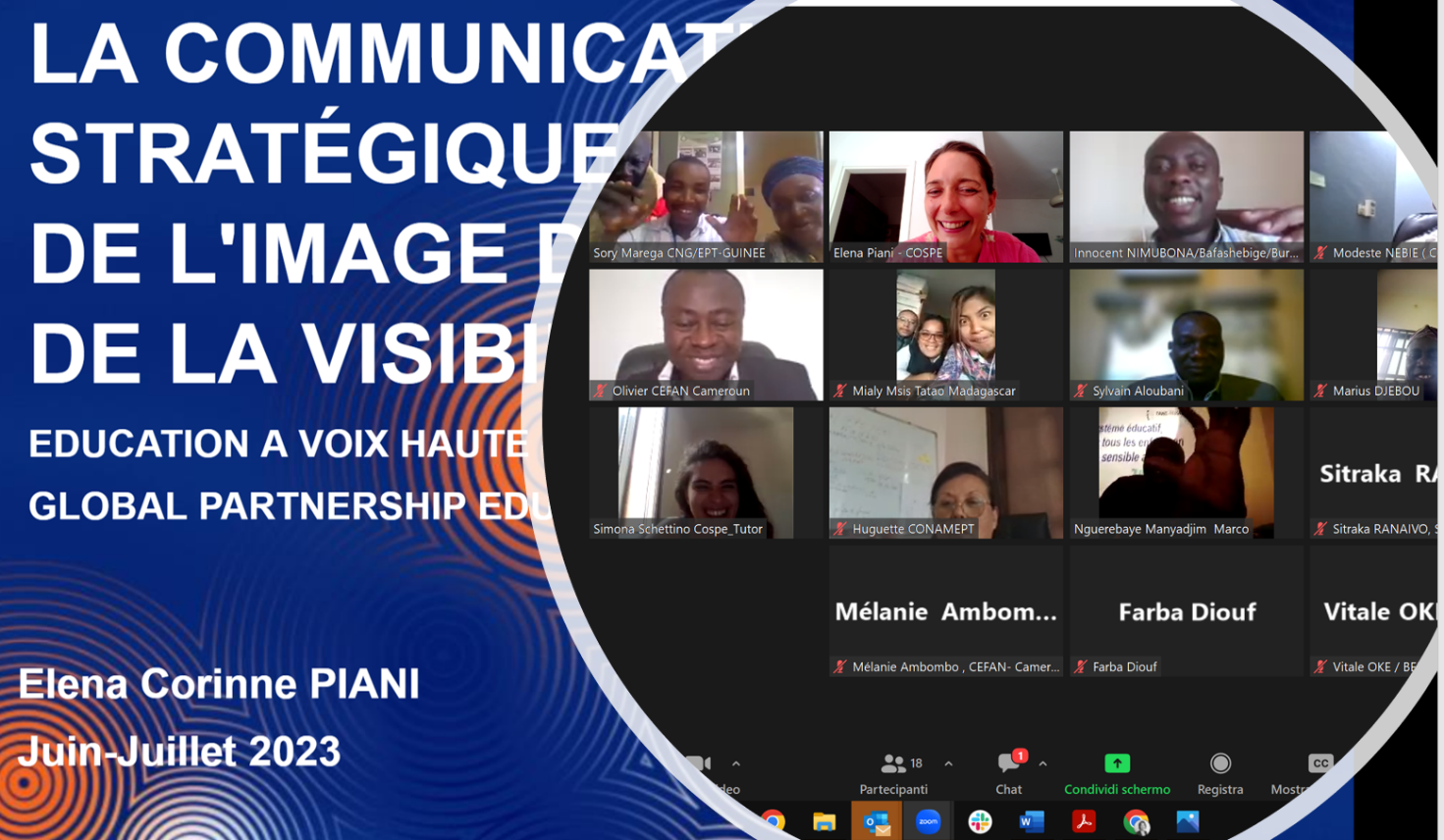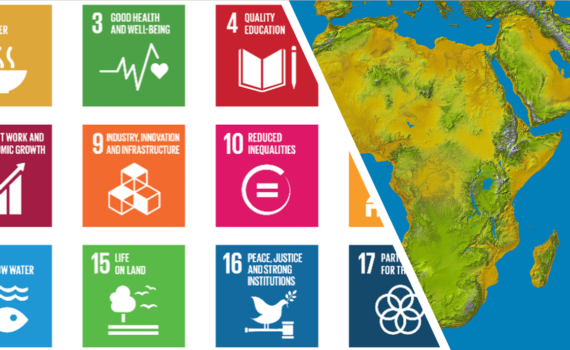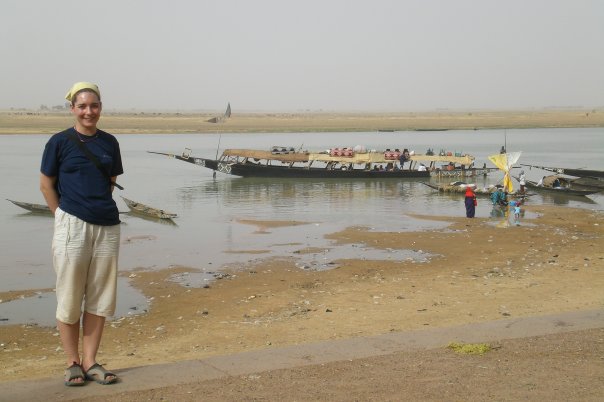Capacity Building in Strategic communications, Media, Branding and Visibility for EOL grantees in the West and Central Africa Region – 60 hours trainer and mentor for 18 NGOs in French

Continuing with its leadership in international cooperation projects COSPE won the request for consultancy services to Education Out Loud (EOL) grantees in the West and Central Africa Region under the EOL Regional Management Unit for West and Central Africa Region (RMU WCA) based in Accra, Ghana.
COSPE hired my services to deliver 60 hours training and mentoring in Strategic Communications to 18 French speaking NGOs (52 participants coming from over 15 different countries) over the month of June-July and August.
The work included, all in French, pre-evaluation of the 18 NGOS communication plans, development of the training materials, delivery, mentoring of each NGO as well as reporting on the class participation, progress and learning outcomes.
These oragnisations are fighting for education for all (Education Pour Tous – EPT) – come of their challenges are rural and urban disparities, social inclusion of disabled children, infrastructure, irresponsible governments, prejudice against education for female (religious and cultural issues) for those who are getting married as minors/adolescents or had Female genital mutilation (FGM), children as soldiers, and going through war and disruption, not to mentioned the climate crisis.
It was a huge challenge to work within tight time constraints, and each organisation is not only different, but also country specific issues were to be managed into the plan development. Wow!
We all learned so much from each other. They improved their strategic communications, and I was inspired by their passion to create a sustainable Africa by 2063. Advocacy of education in their countries, engaging stakeholders using the media their country would enable them to develop.
The beneficiaries were Communication, Administration and Programme staff drawn from the 22 grantee organisations and 67 participants from across Francophone (18 CSOs and 53 participants) and Lusophone (4 CSOs and 14 participants) countries under EOL WCA RMU organised in two languages classes.
FRENCH SPEAKING ORGANISATIONS:
- Coalition Nigérienne des Associations Syndicats et ONG de Campagne EPT (ASO-EPT) Niger;
- CONAMEPT Madagascar;
- CBO/EPT Benin
- Regroupement Education pour Tous et Toutes (REPT) Haïti;
- CEFAN Cameroon;
- Coalition tunisienne pour l’education Tunisie
- COSOCIDE Tchad;
- MSIS TATAO Madagascar;
- DEDRAS Benin
- Coalition Pour L’education pour tous BAFASHEBIGE Burundi;
- CNEPT/BF Burkina Faso;
- GRADE Niger
- CNT/EPT Togo;
- Coalition des organisations Mauritaniennes pour l’Education COMEDUC Mauritania;
- RIPEPT RCI Côte D’ivoire
- CONEPT/RDC DRC;
- CNG/EPT Guinee;
- COSYDEP Senegal.
PORTUGUESE SPEAKING ORGANISATIONS:
- Rede EPT Angola
- RNCEPT Cape Verde
- RECEPT-GB Guine-Bissau
- MEPT Mozambique
The technical course, before the mentoring included the following contents:
- How to identify organisation strategic communication objectives, taking into account organisation dimension, objectives, dedicated resources
- How to define targets, key messages, specific actions and channels taking into account specific context
- Elaborating a simple communication strategy and a communication plan
- How to deal with media: knowledge of media context, tools and strategy for a fruitful interaction
- How to define the roles of internal and, eventually, external providers/actors
- How to develop a CSOs ethical branding and marketing
- How to measure communication impact
About EOL
EOL is an advocacy and social accountability funding mechanism of the Global Partnership for Education (GPE), dedicated to supporting capacity building of civil society organisations and enhancing their engagement in education policy processes. Funded by Global Partnership for Education (GPE), EOL is managed by Oxfam IBIS as the Grant Agent. The overall goal of the EOL programme is to enhance civil society capacity to further GPE 2020 goals in learning, equity, and stronger systems, by improving the par_cipa_on of civil society, their efforts to strengthen advocacy, and to ensure transparency and increased effectiveness in educational policy and implementaton processes.
EOL Program objectives
1. Strengthen national civil society engagement in education planning, policy dialogue and monitoring.
2. Strengthen civil society roles in promoting the transparency and accountability of national educational sector policy and implementation; and
3. Create a stronger global and transnational enabling environment for national civil society advocacy and transparency efforts.
The above objectives also translate to what is referred to as Operational Components (OCs).
Please see https://www.educationoutloud.org for further details about EOL.
Background to the project
The EOL program has a deliberate intention to culivate a learning culture among its grantees and promote application of knowledge learned for adaptive management in their day-to-day operations.
In this project EOL aimed to build the capacity of grantees in Strategic communications, use of the media, branding and visibility.
I strongly encourage you follow EOL and subscribe to the GPE newsletter https://www.globalpartnership.org/subscribe
And of course, support and donate also to COSPE https://www.cospe.org/cosa-puoi-fare-tu/donazione-liberale/
Education is our changemaking topic for sustainable development.














